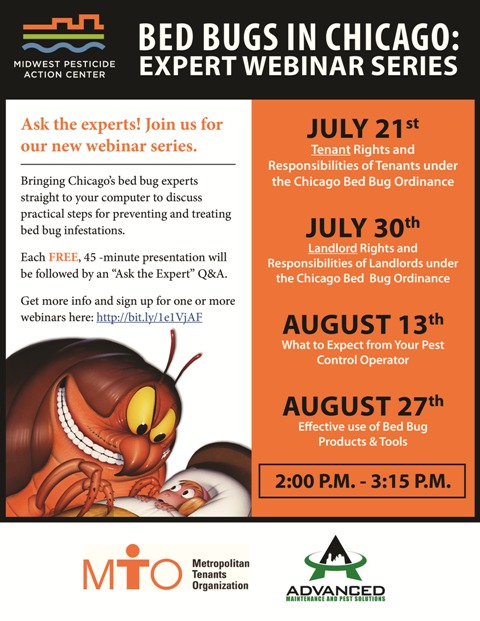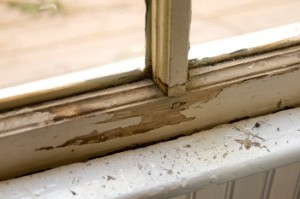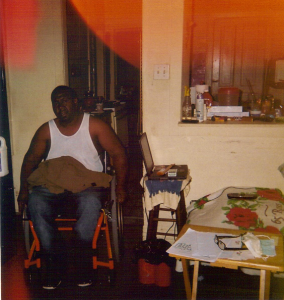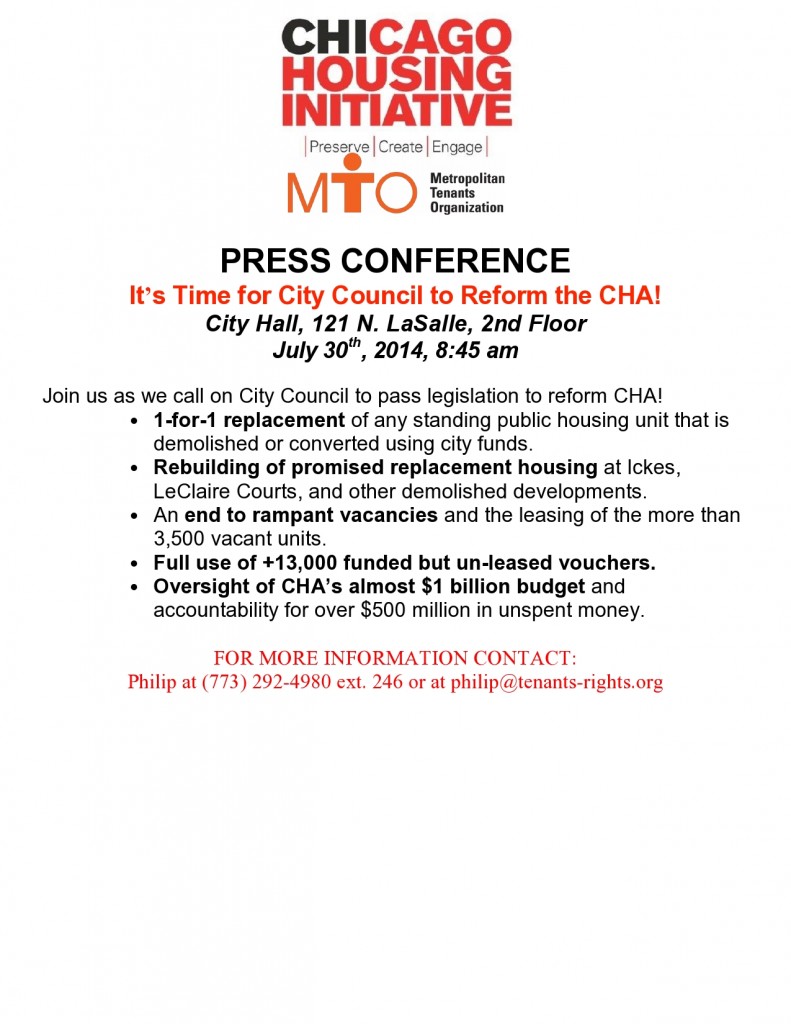ORDINANCE
WHEREAS, The City of Chicago is a home-rule unit of government under Article Vll, Section 6(a) of the 1970 Constitution of the State of Illinois, and, as such, may exercise any power and perform any function pertaining to its government and affairs; and
WHEREAS, The City’s home-rule authority includes the power to enact ordinances and regulations aimed at preserving safe, decent, and affordable housing in Chicago; and
WHEREAS, The City Council has determined that single-room occupancy buildings (SROs) and residential hotels are an essential component of the City’s affordable housing stock, and that these forms of housing are increasingly scarce due to sale and other market forces; and
WHEREAS, The loss of these effectively irreplaceable forms of affordable housing will likely force low-income households into homelessness, a dire outcome that will add to the already crushing burden on public and non-profit agencies that provide the homeless with protective care, social services, health care, psychological counseling, nutritional programs, and other necessary support; and
WHEREAS, For these reasons, the City has a vital interest in maintaining existing affordable housing by discouraging the conversion and demolition of SROs and residential hotels; and
WHEREAS, The City therefore expresses a firm commitment to make resources available, between now and the end of the year 2018, to preserve no less than 700 units of affordable housing for very and extremely low-income Chicagoans, including SRO and residential hotel units, by implementing an aggressive strategy centered on encouraging owners to participate in a variety of incentive programs or to cooperate in the efforts of preservation buyers to acquire such properties; and
WHEREAS, In addition to this commitment on its own behalf, the City recognizes the need to enact new legal requirements tailored to preserve and protect Chicago’s existing SROs and residential hotels; now, therefore,
BE IT ORDAINED BY THE CITY COUNCIL OF THE CITY OF CHICAGO: SECTION
1. The recitals set forth above are incorporated herein by reference and made a part hereof. SECTION
2. Title 5 of the Municipal Code of Chicago is hereby amended by adding a new chapter 5-15, as follows:
CHAPTER 5-15
SINGLE-ROOM OCCUPANCY AND RESIDENTIAL HOTEL PRESERVATION ORDINANCE
5-15-010 Title and purpose.
This chapter shall be known and may be cited as the “Single-Room Occupancy and Residential Hotel Preservation Ordinance,” and shall be liberally construed and applied to achieve its purpose, which is to promote the public welfare by preserving single-room occupancy buildings and residential hotels, thereby sustaining the availability of affordable housing in neighborhoods throughout Chicago. The legislative intent of this chapter is to advance the City’s vital interests in reducing homelessness and maintaining an economically diverse population.
5-15-020 Definitions.
For purposes of this chapter, the following definitions apply:
“Affordable housing” means housing where the residents pay no more than 30% of their adjusted gross monthly household income in rent.
“Commitment Option A.” “Commitment Option B.” and “Commitment Option C” mean the preservation fee calculation mechanisms set forth in Sections 5-15-040 and 5-15-050.
“Conversion” means any action that transforms all or part of a covered property into any type of use, residential or non-residential, that does not fall into the category of covered property.
“Covered property” means any single-room occupancy building, single-room occupancy unit, residential hotel, or residential hotel unit, as well as the land upon which any single-room occupancy building or residential hotel sits, in the City of Chicago.
“Demolition” means any action resulting in the complete or partial, interior or exterior, destruction of a covered property, or the combination of two or more units in a covered property to make a larger unit, or any other action that results in the reduction of the number of units in a covered property.
“Extremely low-income” means those individuals and families whose gross household incomes are between 0 and 30 percent of the median gross household income for the Chicago region, as determined by the Secretary ofthe United States Department of Housing and Urban Development, with adjustments for smaller and larger families.
“Owner” has the meaning ascribed to that term in Section 13-4-010 of the Municipal Code of Chicago.
“Residential hotel” means any building or structure kept, used, maintained, or advertised or held out to the public, as of September 10. 2014. to be an inn, hotel, motel, family hotel, apartment hotel, lodging house, or other place where furnished sleeping or rooming accommodations are made available for hire or rent, with or without meals, and in which seven or more sleeping rooms are used or maintained for the primary residence of guests, lodgers, or roomers who reside in the property for at least 32 consecutive days, and pay rent to the owner.The term “residential hotel” does not include any hospital, convent, monastery, extended care facility, asylum, not-for-profit home for the aged, temporary overnight shelter, transitional shelter or residence, domestic violence shelter or residence, community home, or dormitory owned and operated by an elementary school, high school, or institution of higher learning. For purposes of this definition, a person is not a guest, lodger, or roomer if his or her employer pays, directly or through reimbursement, the costs of his or her lodging.
“Residential hotel unit” means a room within a residential hotel used as, or intended to be used as. a living space by guests, lodgers, or roomers who reside in the property.
“Single-room occupancy building” and “single-room occupancy unit” have the meanings ascribed to those terms in Section 13-4-010 of the Municipal Code of Chicago.
“Subsidized affordable housing” means affordable housing where individuals and families reside and pay rent to the owner with the benefit of governmental or charitable rental subsidies, rental assistance payments, or other housing assistance payment contracts, which may create a third-party right to the tenancy.
“Unsubsidized affordable housing” means affordable housing where individuals and families reside and pay rent to the owner without the benefit of any governmental or charitable rental subsidies, rental assistance payments, or other housing assistance payment contracts.
“Very low-income” means those individuals and families whose gross household incomes are between 30 and 50 percent of the median gross household income for the Chicago region, as determined by the Secretary of the United States Department of Housing and Urban Development, with adjustments for smaller and larger families.
5-15-030 Preservation fees.
The amount of any preservation fee remitted pursuant to this chapter shall be calculated by the commissioner of planning and development, and the funds shall be utilized for the development, improvement, and preservation of single-room occupancy buildings and residential hotels. The amount of such fees shall be adjusted annually based upon the United States Department of Labor, Bureau of Labor Statistics’s Consumer Price Index for all Urban Consumers for the Chicago metropolitan area, or, if this index no longer exists, some other comparable index, selected by the commissioner of planning and development in his reasonable discretion. The City shall establish and promote a process for owners and purchasers of covered properties to apply for financial incentives in exchange for entering into binding land-use agreements to preserve the properties as single-room occupancy buildings and residential hotels.
5-15-040 Conversion or demolition of covered properties – prerequisites.
The department of buildings shall not process any permit allowing the conversion or demolition of a covered property. or any new development on the site of a demolished covered property. until the property’s owner has filed, and the commissioner of buildings granted, an application for clearance. The commissioner of buildings shall prescribe the form of this application, and shall not grant an application unless the owner meets the requirements described in either subsection 5-15-040(a) or subsection 5-15-040(b).
(a) In lieu of proceeding pursuant to subsection 5-15-040(b). the owner shall enter into a binding land-use agreement with the City: (1) providing that the proposed project will create and/or retain at the property a number of units equal to a percentage of the number of units in the existing property as subsidized or unsubsidized affordable housing for very and extremely low-income individuals and families; and (2) agreeing to maintain those units as subsidized or unsubsidized affordable housing for very and extremely low-income individuals and families for a period of not less than 20 years. If the committed percentage is less than 20%. the owner shall also remit to the City a preservation fee in the amount of 20% of the units minus the committed percentage of units times $200.000 (as adjusted pursuant to Section 5-15- 030). For example, if the owner of a 100-unit building commits a number of units equal to 15% of the property’s units, he shall remit to the City a preservation fee in the amount of $1,000.000: 20% of 100 (i.e.. 20) minus 15% of 100 (i.e.. 15) equals five: five times $200,000 equals $1,000,000. For purposes of this chapter, this option shall be referred to as “Commitment Option A.”
(b) In lieu of proceeding pursuant to subsection 5-15-040(a). the owner shall remit to the City a preservation fee in the amount of 20% of the number of units in the existing property times $200.000 (as adjusted pursuant to Section 5-15-030). For example, if the owner of a 100- unit building proceeds under this subsection 5-15-040(b). he shall remit to the City a preservation fee in the amount of $4.000.000: 20% of 100 (i.e., 20) times $200,000 equals $4,000.000. For purposes of this chapter, this option shall be referred to as “Commitment Option B.”
5-15-050 Sale or transfer of covered properties – prerequisites.
Before selling or otherwise transferring ownership of a covered property. the owner shall meet the requirements described in either subsection 5-15-050(a) or subsection 5-15-050(b).
(a) (1) The owner may choose to:
(A) provide to the department of planning and development by first class mail, and to the residents of the property by hand delivery and first class mail, at least 180 days’ notice of the proposed sale or transfer of the property:
(B) allow the property’s residents or any representative of the residents 180 days following the date of notice to tender an offer to purchase the property: and
(C) upon receiving any such offer, engage in good-faith negotiations, during the remaining portion of the 180-day period described in subsection 5-15-050(a)(1)(B), towards a purchase and sale agreement with the offering party.
(2) If the owner accepts an offer tendered and negotiated in the manner described in subsection 5-15-050(a)(1). then the owner shall include in the contract for sale or transfer a clause whereby the purchaser agrees to maintain, for a period of not less than 20 years, a number of units equal to at least 33% of the current number of units at the property as subsidized or unsubsidized affordable housing for very and extremely low-income individuals and families.
(3) If the owner receives an offer and meets the requirement of negotiating in good faith, as described in subsections 5-15-050(a)(1)(B) and (C), but does not reach a purchase and sale agreement with the offering party, then the owner shall be allowed a period of 60 days following the end of the 180-notice period described in subsection 5-15-050(a)(1)(A) within which to sell or transfer the property to any other party. If an owner sells or transfers a property pursuant to this subsection 5-15-050(a)(3). he shall include in the contract for sale or transfer a clause whereby the purchaser agrees to comply with either Commitment Option A or Commitment Option B. Beginning on the 61st day following the end of the 180-day notice period described in subsection 5-15-050(a)(1)(A). the owner shall not sell the property without either repeating the process described in subsection 5-15-050(a)(1) or meeting the requirements in subsection 5-15-050(b).
(b) In lieu of proceeding pursuant to subsection 5-15-050(a), the owner may opt out of the right-to-purchase process described in that subsection by remitting to the City a preservation fee in the amount of 30% of the number of units in the property times $200.000 (as adjusted pursuant to Section 5-15-030). For example, if the owner of a 100-unit building proceeds under this subsection 5-15-050(b). he shall remit to the City a preservation fee in the amount of $6,000,000: 30% of 100 (i.e., 30) times $200.000 equals $6.000.000. For purposes of this chapter, this option shall be referred to as “Commitment Option C.”
5-15-060 Anti-displacement and relocation requirements.
(a) Each resident of a covered property scheduled to be demolished, converted, or sold or otherwise transferred, who has resided in the property for at least 31 consecutive days preceding the date the owner initiates any of the processes described in Sections 5-15-040 and 5-15-050, shall be considered a long-term resident. Each owner of a covered property who undertakes any of the processes described in Sections 5-15-040 and 5-15-050 in a manner that will result in the displacement of residents shall submit a list of all long-term residents to the commissioner of planning and development and, where applicable, to the purchaser of the property.
(b) In situations where a covered property is scheduled to be converted, demolished and replaced, or sold or otherwise transferred in a manner that results in the displacement of residents, the owner or purchaser, as applicable, shall determine which, if any, of the current income-eligible and lease-compliant long-term residents wish to return to the property. If the number of affordable units scheduled to be retained is less than the number of long-term residents wishing to return, then the owner or purchaser, as applicable, shall determine via lottery which of those residents to invite to return to the property.
(1) In situations where conversion or construction renders the property temporarily uninhabitable, the owner shall arrange for comparable temporary accommodations, as defined by the commissioner of planning and development, for each resident who is invited and intends to return to the property. as well as all reasonable moving and related expenses, not to exceed one month’s rent (or the amount of rent the resident has paid over the most recent 30 days, if rent is not paid on a monthly basis).
(2) In all cases under this subsection 5-15-060(b). the owner or purchaser, as applicable, shall refund to each resident who is not invited to return to the property any security deposit, any interest due on the security deposit, and all prepaid rent. In addition, the owner or purchaser as applicable, shall pay each displaced long-term resident a one-time relocation assistance fee in the amount of the greater of $2.000.00 or three months’ rent (or three times the amount of rent the resident has paid over the most recent 30 days, if rent is not paid on a monthly basis). The owner or purchaser, as applicable, shall also give each displaced long-term resident the option of placement on a waitlist for an affordable housing unit in the property.
(c) In situations where a covered property is scheduled to be sold or otherwise transferred pursuant to the terms described in subsection 5-15-050(b), the owner shall refund each resident’s security deposit, any interest due on the security deposit, and all prepaid rent, and shall pay each long-term resident a one-time relocation assistance fee in the amount of $10.600.00.
5-15-070 Change in terms of rental, lease, or occupancy agreements.
The owner of a covered property shall hand deliver to each resident written notice of any change in the terms of that resident’s rental, lease, or occupancy agreement, including changes in the frequency or amount of payment for rent, occupancy. or other housing purposes. The timinq of this notice shall be determined by the resident’s existinq rental, lease, or occupancv aqreement. whether written or oral. For example, if a resident pays rent on a weekly basis, he is entitled to one week’s notice pursuant to this section. A rent increase imposed in compliance with this section shall not constitute retaliatory conduct as contemplated in Section 5-12-150 of this Code, so lonq as the increase is imposed on a property-wide basis.
5-15-080 Provision of room keys to residents.
The owner of a covered propertv shall provide each resident a copy of the key to his room. If an owner violates this section, the affected resident shall be entitled to $2.000.00 or twice the monetary value of the damaqes sustained, whichever is qreater
5-15-090 Enforcement.
(a) Any resident of a covered property who is injured by a violation of this chapter may institute injunctive, mandamus, or any other appropriate legal action seeking enforcement. A resident who institutes a leqal action pursuant to this chapter and is adiudqed to be a prevailinq partv mav be awarded attorney’s fees and court costs.
(b) If the City initiates or joins any enforcement action against an owner who violates or resists enforcement of this chapter, the owner shall be fined not less than $200.00 nor more than $500.00 for each offense upon which a finding of liability is entered. Each day a violation continues shall constitute a separate offense.
(c) If the owner of a covered property sells the property before remitting to the City a preservation fee required under this chapter, both the owner and purchaser shall be jointly and severely liable for the payment of such fee.
SECTION 3. This ordinance shall take effect 10 days after its passage and publication.
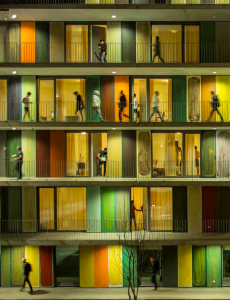 There is a strong consensus that we need more inclusive and stronger democratic societies. We all acknowledge that access to decent affordable housing in integrated societies where everyone can feel ‘at home’, is one of the fundamental pillars in well- functioning democratic societies. Exclusion, poverty and insecurity foster fear and hostile environments.
There is a strong consensus that we need more inclusive and stronger democratic societies. We all acknowledge that access to decent affordable housing in integrated societies where everyone can feel ‘at home’, is one of the fundamental pillars in well- functioning democratic societies. Exclusion, poverty and insecurity foster fear and hostile environments.


